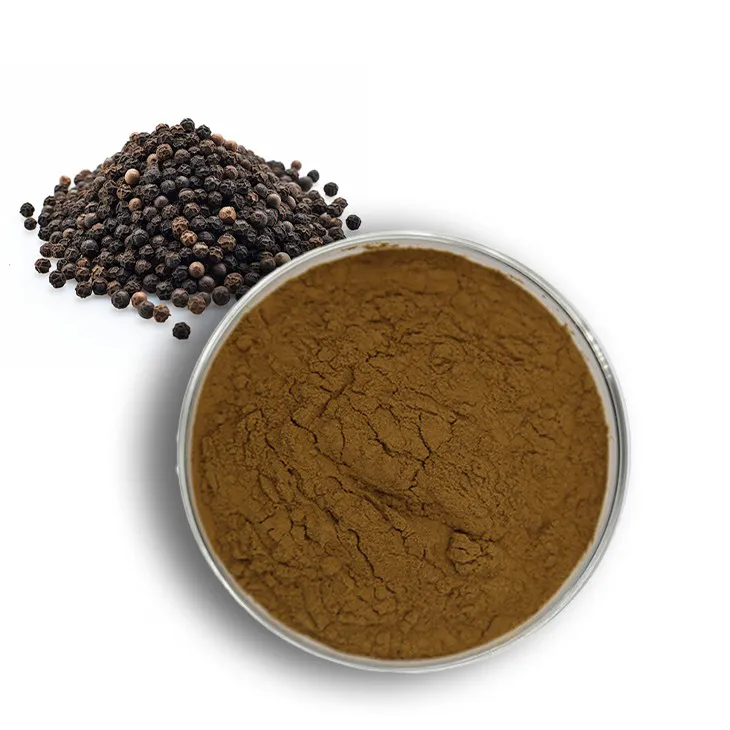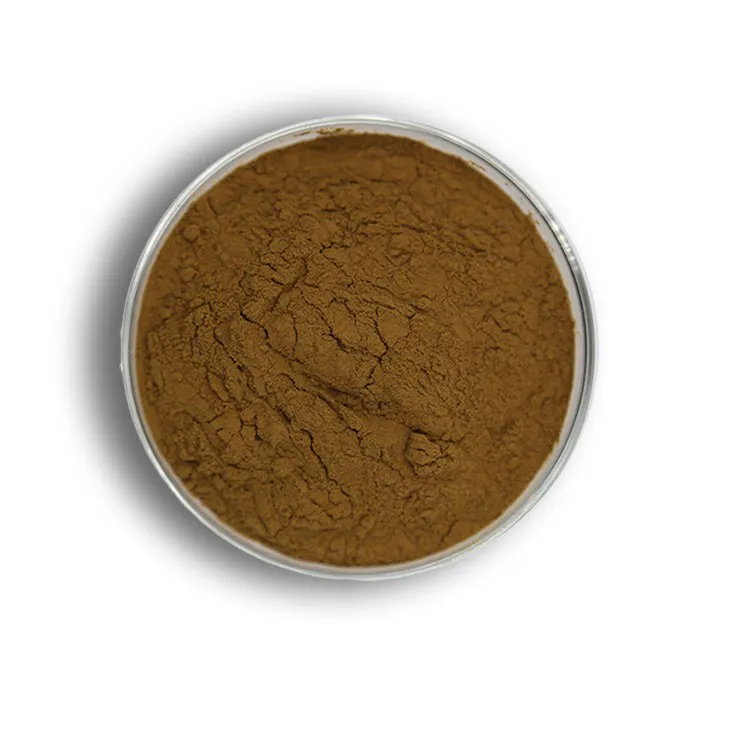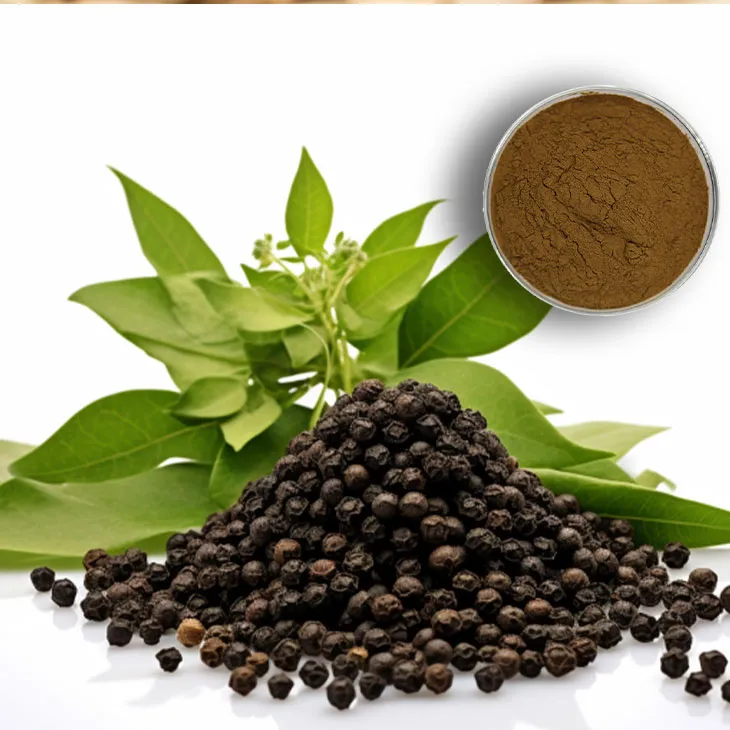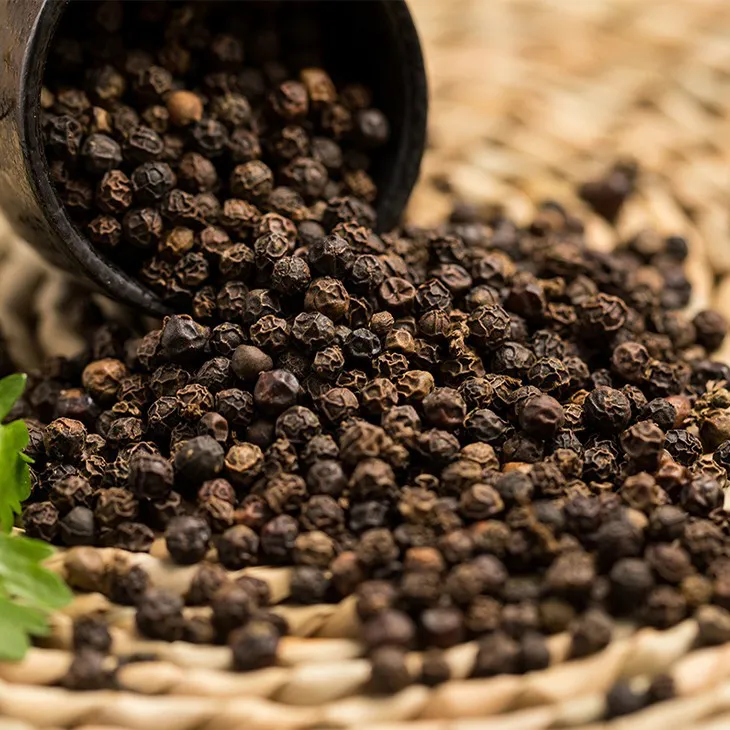- 0086-571-85302990
- sales@greenskybio.com
Components of black pepper extract in fertilizers and feeds.
2024-11-26

1. Introduction
Black pepper (Piper nigrum) has been used for centuries not only in the culinary world but also in traditional medicine. In recent years, the extract of black pepper has gained significant attention in the fields of fertilizers and feeds. This is mainly due to its potential to enhance plant growth in fertilizers and improve animal health and productivity in feeds. Understanding the components of Black Pepper Extract in these two areas is crucial for fully exploiting its benefits.

2. Components of Black Pepper Extract in Fertilizers
2.1 Piperine
Piperine is one of the most important components in Black Pepper Extract. In fertilizers, piperine has shown several beneficial effects on plants.
Firstly, it has been found to enhance the root development of plants. Piperine can stimulate the growth of root hairs, which are crucial for the absorption of water and nutrients from the soil. This leads to a more efficient uptake of essential elements such as nitrogen, phosphorus, and potassium, thereby promoting overall plant growth.
Secondly, piperine can act as a natural pesticide in a way. It has been observed to have some repellent effects on certain pests. By reducing the pest pressure on plants, it indirectly contributes to better plant health and growth. For example, in some field trials, plants treated with black pepper extract containing piperine had fewer incidences of pest attacks compared to untreated plants.
Finally, piperine may also play a role in enhancing the plant's stress tolerance. It can help plants better withstand environmental stresses such as drought and salinity. This is thought to be related to its ability to modulate certain physiological processes within the plant, such as the regulation of antioxidant enzymes.
2.2 Essential Oils
Black pepper extract contains various essential oils, which also contribute to its potential as a fertilizer component.
- These essential oils can improve the soil structure. They can enhance the aggregation of soil particles, which in turn improves soil aeration and water - holding capacity. This creates a more favorable environment for root growth and the activity of soil - dwelling organisms such as beneficial bacteria and fungi.
- Some of the essential oils in black pepper extract have been shown to have antimicrobial properties in the soil. They can inhibit the growth of harmful soil - borne pathogens, reducing the risk of root diseases. For example, certain fungi that cause root rot may be suppressed in the presence of these essential oils.
- The volatile nature of the essential oils can also have an impact on the surrounding environment of the plant. They can act as signaling molecules, influencing the behavior of neighboring plants and organisms. In some cases, they may stimulate the growth of neighboring plants through a process known as allelopathy.
2.3 Flavonoids
Flavonoids present in black pepper extract are another group of important components in the context of fertilizers.
Flavonoids can act as chelating agents, binding to metal ions in the soil. This helps in making these metal ions more available to plants. For instance, iron is an essential micronutrient for plants, but in many soils, it is present in forms that are not easily accessible to plants. Flavonoids can bind to iron and convert it into a more plant - available form, thus preventing iron deficiency in plants.
They also have antioxidant properties within the plant. By scavenging reactive oxygen species (ROS), flavonoids can protect plant cells from oxidative damage. This is especially important during periods of stress, such as high light intensity or nutrient deficiency, when the production of ROS in plants is increased.

3. Components of Black Pepper Extract in Feeds
3.1 Piperine in Feeds
When it comes to feeds, piperine again plays a significant role.
Piperine can enhance the digestibility of feed in animals. It has been shown to stimulate the secretion of digestive enzymes in the gastrointestinal tract. For example, in poultry, piperine can increase the secretion of pancreatic enzymes, which are responsible for breaking down proteins, carbohydrates, and fats in the feed. This leads to better utilization of the nutrients present in the feed, resulting in improved growth performance of the animals.
It also has potential antimicrobial properties in the gut of animals. The gut microbiota plays a crucial role in animal health, and an imbalance in the gut microbiota can lead to various diseases. Piperine can help in maintaining a healthy gut microbiota by inhibiting the growth of harmful bacteria. In pigs, for instance, it has been observed that piperine - supplemented feed can reduce the population of pathogenic Escherichia coli in the gut.
Furthermore, piperine may have an impact on the immune system of animals. It can enhance the immune response of animals, making them more resistant to diseases. This is thought to be related to its ability to modulate certain immune - related signaling pathways in the body.
3.2 Essential Oils in Feeds
The essential oils in black pepper extract are also beneficial when used in animal feeds.
- They can improve the palatability of the feed. Animals are more likely to consume feed that has a pleasant smell and taste. The addition of black pepper extract with its characteristic essential oils can make the feed more appealing to animals, especially when dealing with finicky eaters. For example, in some fish species, the addition of black pepper extract - containing essential oils has been shown to increase feed intake.
- Essential oils can also have antioxidant and anti - inflammatory properties in the animal body. In ruminants, such as cows, these properties can help in reducing oxidative stress and inflammation in the body, which are often associated with various health problems. By reducing oxidative stress, the overall health and productivity of the animals can be improved.
- Some essential oils can act as natural coccidiostats in poultry. Coccidiosis is a common parasitic disease in poultry, and the use of chemical coccidiostats has raised concerns about drug resistance and residues in meat. The essential oils in black pepper extract can be an alternative to chemical coccidiostats, as they have shown potential in controlling coccidia in poultry.
3.3 Flavonoids in Feeds
Flavonoids in black pepper extract also offer certain advantages when used in animal feeds.
They can act as natural pigments in some cases. For example, in the production of colored eggs or meat, flavonoids can contribute to the coloration. This can be an important factor in the marketability of animal products.
Flavonoids also have potential health - promoting effects in animals. They can help in reducing cholesterol levels in animals, which is beneficial for the long - term health of animals. In addition, they may have anti - carcinogenic properties, although more research is needed in this area to fully understand their role in preventing cancer in animals.

4. Conclusion
Black pepper extract contains a variety of components such as piperine, essential oils, and flavonoids that have significant potential in both fertilizers and feeds. In fertilizers, these components can enhance plant growth, improve soil conditions, and increase plant resistance to pests and stresses. In feeds, they can improve animal health, productivity, and the quality of animal products.
However, more research is still needed to fully understand the mechanisms of action of these components and to optimize their use in both fertilizers and feeds. With further investigation, black pepper extract could become an important and sustainable ingredient in the agricultural and livestock industries.

FAQ:
Question 1: What are the main components of black pepper extract?
The main components of black pepper extract include piperine, which is one of the most well - known and important components. There are also various essential oils, flavonoids, and alkaloids. Piperine is responsible for many of the biological activities associated with black pepper extract, such as antioxidant and anti - inflammatory properties.
Question 2: How do the components of black pepper extract benefit plant growth in fertilizers?
The components like piperine in black pepper extract can act as growth stimulants. They may enhance nutrient uptake in plants. For example, they can influence the activity of root transporters, allowing plants to absorb more essential nutrients such as nitrogen, phosphorus, and potassium. Also, the antioxidant properties of some components can protect plants from oxidative stress during growth.
Question 3: In what ways do the components of black pepper extract affect animal health in feeds?
The components can have multiple effects. Piperine, for instance, has been shown to improve digestion in animals. It can enhance the secretion of digestive enzymes, which helps in better breakdown and absorption of nutrients from the feed. Some of the flavonoids may also have immunomodulatory effects, strengthening the animal's immune system and making them more resistant to diseases.
Question 4: Are there any potential negative impacts of the components of black pepper extract in fertilizers or feeds?
While black pepper extract has many benefits, there can be potential negative impacts if not used properly. In high concentrations in fertilizers, some components might cause phytotoxicity in plants. In feeds, excessive amounts could potentially disrupt the normal gut microbiota balance in animals. However, when used within the appropriate dosage range, these negative impacts are usually minimal.
Question 5: How can the components of black pepper extract be effectively extracted for use in fertilizers and feeds?
There are several extraction methods. One common method is solvent extraction, using solvents like ethanol or methanol to extract the active components from black pepper. Another approach is supercritical fluid extraction, which can be more efficient in extracting the components while maintaining their bioactivity. After extraction, purification steps may be required to obtain a high - quality extract suitable for use in fertilizers and feeds.
Related literature
- Analysis of Bioactive Components in Black Pepper Extract for Agricultural Applications"
- "The Role of Black Pepper Extract Components in Animal Nutrition"
- "Black Pepper Extract: Composition and Its Impact on Plant and Animal Health"
- ▶ Hesperidin
- ▶ Citrus Bioflavonoids
- ▶ Plant Extract
- ▶ lycopene
- ▶ Diosmin
- ▶ Grape seed extract
- ▶ Sea buckthorn Juice Powder
- ▶ Fruit Juice Powder
- ▶ Hops Extract
- ▶ Artichoke Extract
- ▶ Mushroom extract
- ▶ Astaxanthin
- ▶ Green Tea Extract
- ▶ Curcumin
- ▶ Horse Chestnut Extract
- ▶ Other Product
- ▶ Boswellia Serrata Extract
- ▶ Resveratrol
- ▶ Marigold Extract
- ▶ Grape Leaf Extract
- ▶ New Product
- ▶ Aminolevulinic acid
- ▶ Cranberry Extract
- ▶ Red Yeast Rice
- ▶ Red Wine Extract
-
Scutellaria Extract
2024-11-26
-
Black Pepper Extract
2024-11-26
-
Eucommia Ulmoides Extract
2024-11-26
-
Lemon Juice Powder
2024-11-26
-
Jujube Extract
2024-11-26
-
Citrus Aurantium Extract
2024-11-26
-
Green Tea Extract
2024-11-26
-
Stevia Extract
2024-11-26
-
Soy Extract
2024-11-26
-
Maitake Mushroom Extract
2024-11-26




















